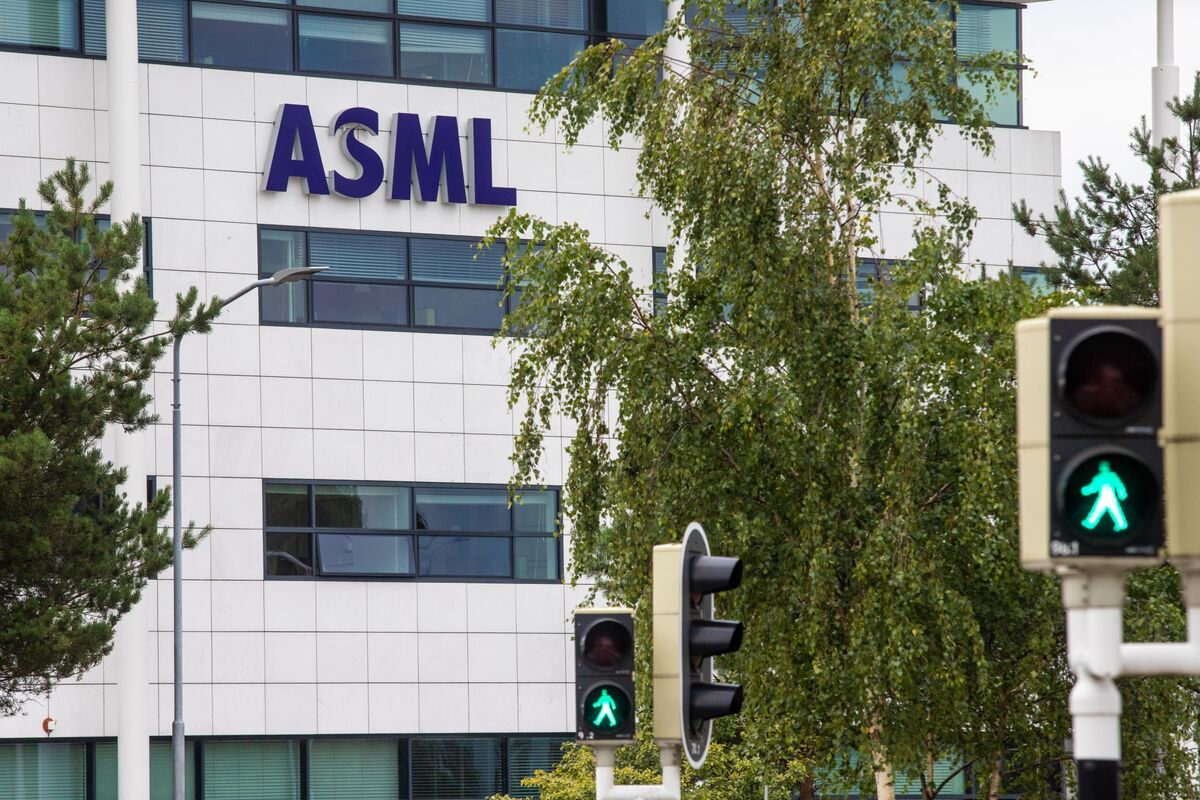ASML Holding NV and Taiwan Semiconductor Manufacturing Co. have ways to disable the world’s most sophisticated chipmaking machines in the event that China invades Taiwan, according to people familiar with the matter.
Officials from the US government have privately expressed concerns to both their Dutch and Taiwanese counterparts about what happens if Chinese aggression escalates into an attack on the island responsible for producing the vast majority of the world’s advanced semiconductors, two of the people said, speaking on condition of anonymity.
ASML reassured officials about its ability to remotely disable the machines when the Dutch government met with the company on the threat, two others said. The Netherlands has run simulations on a possible invasion in order to better assess the risks, they added.
Spokespeople for ASML, TSMC and the Dutch trade ministry declined to comment. Spokespeople for the White House National Security Council, US Department of Defense and US Department of Commerce didn’t respond to emailed requests for comment.
The remote shut-off applies to Netherlands-based ASML’s line of extreme ultraviolet machines, known within the industry as EUVs, for which TSMC is its single biggest client. EUVs harness high-frequency light waves to print the smallest microchip transistors in existence — creating chips that have artificial-intelligence uses as well as more sensitive military applications.
China has long claimed that the island of Taiwan is its territory, with President Xi Jinping both advocating for peaceful unification and refusing to rule out a military intervention. While US officials have warned that China is seeking the capability to invade Taiwan by 2027, Taiwanese officials have downplayed the threat of an imminent invasion and officials in Beijing have said the American warnings of a timeline are baseless. The People’s Liberation Army isn’t massing troops on the coast and Xi has been primarily focused on steadying China’s economy to hit long-term development goals. Global Chip War
About the size of a city bus, an EUV requires regular servicing and updates. As part of that, the company can remotely force a shut-off which would act as a kill switch, the people said, speaking on condition of anonymity. The Veldhoven-based company is the world’s only manufacturer of these machines, which sell for more than €200 million ($217 million) apiece.
ASML’s technology has long been subject to government interventions aimed at preventing it from falling into the wrong hands. The Netherlands prohibits the company from selling EUV machines to China, for instance, because of US fears they could lend its rival an edge in the global chip war.
It was at the behest of the US that the Dutch began this year to halt exports of ASML’s next-most sophisticated chipmaking machines. Even before that ban took effect, US officials had asked ASML to cancel some previously scheduled shipments to Chinese customers, Bloomberg News reported.
The company expects as much as 15% of this year’s sales to China will be affected by the latest export-control measures.
Evidence suggests the restrictions may have come too late to stem Chinese advances. Huawei Technologies Co. last year produced a smartphone to rival Apple Inc.’s iPhone using chips made with older ASML printers in combination with tools from two US suppliers, Bloomberg News reported in October after conducting a break-down of the phone.
Beijing has made technological self-sufficiency a national priority and Huawei’s efforts to advance domestic chip design and manufacture have received government backing.
The Biden administration is also looking to boost semiconductor production on American soil, promising $39 billion in grants to chipmakers to hedge against any future supply-chain disruption.
The stakes are high, with around 90% of the world’s most advanced chips made in Taiwan. On May 20, Taiwan inaugurated Lai Ching-te as president in the global chip hub, putting in power a man Beijing has branded an “instigator of war.”
Read More: Taiwan’s New President Calls On China to End Threat of War
The EUV machine has helped turn ASML into Europe’s most valuable tech stock with a market capitalization topping $370 billion — more than double that of its client Intel Corp.
ASML has shipped more than 200 of these machines to clients outside China since they were first developed in 2016, with TSMC snatching up more of them than any other chipmaker.
EUVs require such frequent upkeep that without ASML’s spare parts they quickly stop working, the people said. On-site maintenance of the EUVs poses a challenge because they’re housed in clean rooms that require engineers to wear special suits to avoid contamination.
ASML offers certain customers joint service contracts where they do some of the routine maintenance themselves, allowing clients like TSMC to access their own machines’ system. ASML says it can’t access its customers’ proprietary data.
TSMC Chairman Mark Liu hinted in a September interview with CNN that any invader of Taiwan would find his company’s chipmaking machines out of order.
Makes sense to me, I think even someone borderline tech illiterate the way I am could create a perfectly good way to remotely disable a machine and prevent anyone studying it to reverse engineer it, I call it ‘Renotely detonated bucket of thermite’
I remember a talk a few years ago where someone engineered controlled detonations to destroy a single server in a rack without damaging any surrounding equipment. Was pretty fun to follow the engineering.
A smoke bomb/flare would actually be more effective. Its effects would cover more area and be devastating to that kind of machinery.
You don’t want to leave anything copyable in the wreckage either, though.
True.
No shit. These machines are as advanced as a nuclear power plant, they’re gonna have a bit more proprietary software and security protocols than you’d think. Not as simple as just pressing “start” with these machines.
I wonder if asianometry will do a video about the software on ASML machines sometime.
0% surprised. This itself would be a fallback if they can’t get the C4 in place in time, I’d expect. Unless it literally is just a small amount of C4 that’s built in.
It’s probably something easier to set up, like a couple of fuses in the package that, when a signal is applied to a particular set of pins, will blow and disable the chip.
It could be, that would certainly be safer. I don’t think that sounds easier to set up than an explosive charge, though.
If it’s not based on physical destruction, I’d guess it’s some variant of a killer poke (so the thing is set to burn itself out or actuate parts into damaging configurations), combined with a thorough wipe of all software.
It would be far easier for the manufacturer to set up fuses that a killer poke could blow than to jump through all of the (legal) hoops to get hold of an explosive of some kind. And get Legal ready for it, because nothing like this ever affects only the intended group you don’t like. To put it another way, one USian gets hurt because it went off at the wrong time and they’re in a world of shit.
In this specific case, a spook from the US government would be in the room with them when they discussed it, so procurement isn’t a problem. Safety would be a real concern, though, you’re right.
Seems simple enough to clear any calibrations/recipes, and it’ll take years to get that back without the right tools/know how. Maybe pull the filters on the clean room on the way out the door, too, really burn that bridge.
Unfortunately though, there’s always one guy in the office who knows how to get the machine running, even if it’s a pile of smoldering charcoal, with a not-approved-by-IT USB drive that has backups of the weirdest stuff, from three updates ago.
It doesn’t matter because China will get to that level soon. They’re progressing very rapidly through a booming research and espionage sector
No, they are not. There are certain high technologies, especially litographic equipment, that China can not produce and can not catch up to, because it’s a moving target and they will be perpetually lagging behind. The end result will be the exact same issue that Eastern Bloc computing suffered from during the Cold War.
My bad. I swear I had seen articles saying Chinese cpus were catching up. I went back and looked at those articles and the articles basically provide 0 evidence or benchmarks so you’re probably right that there is a significant gap that isn’t likely to close anytime soon.
Sure, no problem:
ssh root@euv-deep-space-cleanroom-4. Followed-by:rm -rf --no-preserve-root /. I do this all the time, to increase revenue stream.Disclaimer: I actually work at ASML.
Me too, how is it going with Greg from finance?
Is Lisa still running site security?
Yeah she’s the best, and in three weeks she’s going on maternity leave, rumor has it that Susie will take her place but don’t spread it around.
Give her my best!
TSMC equipment only has the materials to function for about two weeks before needing a shipment of replacement parts for the fabs when they wear out.
Yeah. Nothing lasts all that long when put next to 400,000 degree plasma. The bigger risk is just know-how that the Chinese could take advantage of, either by employing former staff or copying what they find.
I feel like the US would just bomb them
If they could get away with it.
But if China sees chip making as a state asset, I wonder if, knowing this, they may now be able to prevent it.
Hmm








